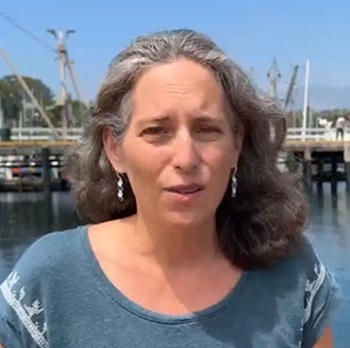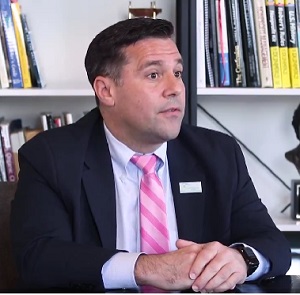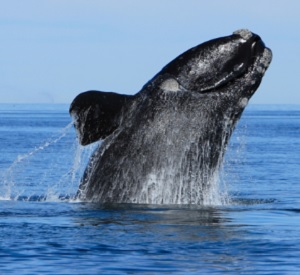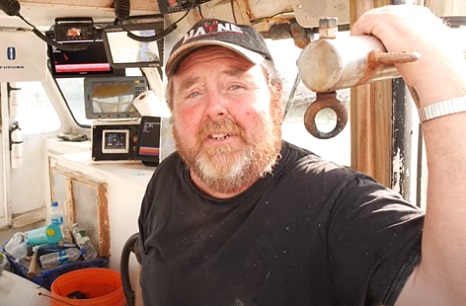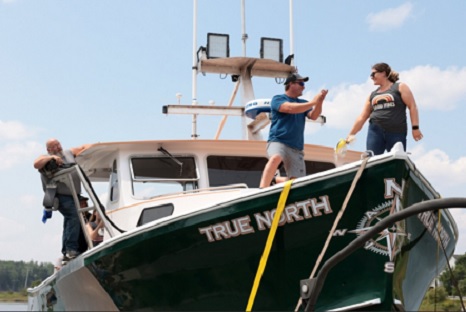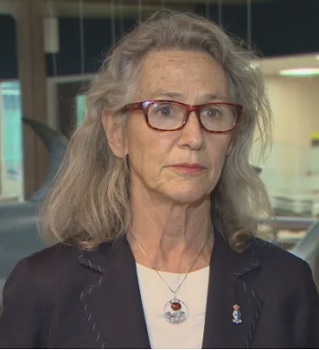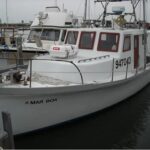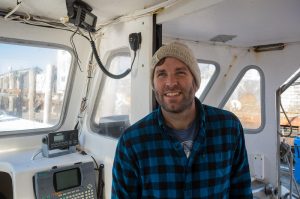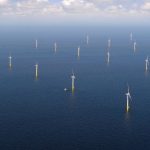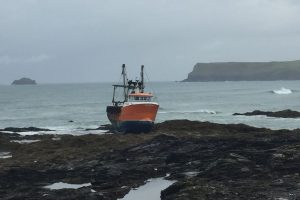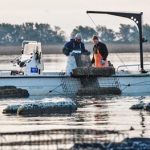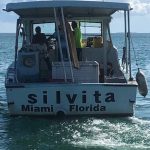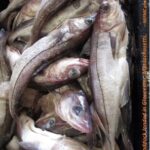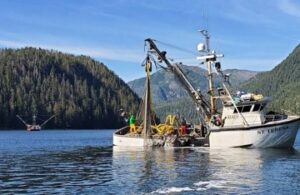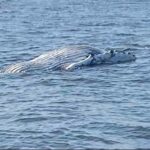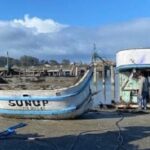Tag Archives: environmentalists
With right-wing backing, New England offshore wind opponents gain strength
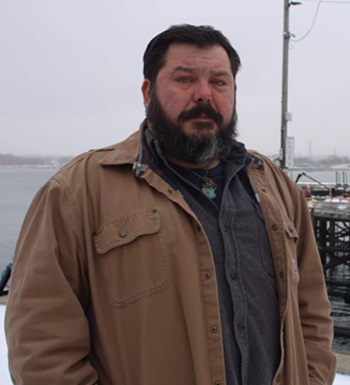 Jerry Leeman III is a fifth generation Maine fisherman and looks the part: broad shoulders, muscular hands, scraggly black beard with streaks of gray. Sitting at the head of an empty boardroom table in his South Portland office, he rails against the buildout of offshore wind currently getting underway in the Northeast. Leeman has read the government’s environmental assessments, and he’s heard scientific experts say turbines won’t destroy the marine ecosystem — but he doesn’t trust them. Plenty of fishermen in the Northeast feel they’re being squeezed out of existence by federal regulations and offshore wind development. But Leeman has a bigger platform than most. He founded and now leads the New England Fishermen’s Stewardship Association, better known as NEFSA. more, >>CLICK TO READ<< 06:18
Jerry Leeman III is a fifth generation Maine fisherman and looks the part: broad shoulders, muscular hands, scraggly black beard with streaks of gray. Sitting at the head of an empty boardroom table in his South Portland office, he rails against the buildout of offshore wind currently getting underway in the Northeast. Leeman has read the government’s environmental assessments, and he’s heard scientific experts say turbines won’t destroy the marine ecosystem — but he doesn’t trust them. Plenty of fishermen in the Northeast feel they’re being squeezed out of existence by federal regulations and offshore wind development. But Leeman has a bigger platform than most. He founded and now leads the New England Fishermen’s Stewardship Association, better known as NEFSA. more, >>CLICK TO READ<< 06:18
Warning of Potential Conflict Between Fishing Industry and Energy Developers
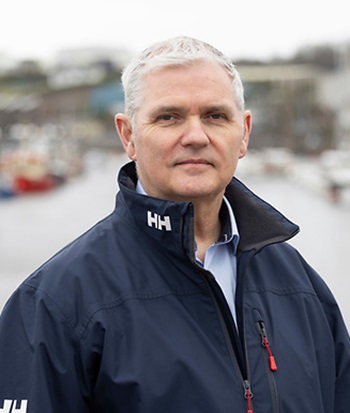 There is a potential for conflict between fishermen and the ‘blue economy’ strategists, according to one of the leading figures in the fishing industry. The fishing industry says that it supports the need for climate change, but it is being claimed that it is being “squeezed out” of traditional fishing grounds and that the role of the industry as a food supplier is not being understood by Government, offshore renewable energy developers or environmentalists. The Chief Executive of the Irish Fish Producers’ Organisation, Aodh O Donnell, has now warned of potential conflict and that there is a commercial motive of exporting power outside Ireland, while fishing operations and practices could be closed. more, >>CLICK TO READ<< 07:38
There is a potential for conflict between fishermen and the ‘blue economy’ strategists, according to one of the leading figures in the fishing industry. The fishing industry says that it supports the need for climate change, but it is being claimed that it is being “squeezed out” of traditional fishing grounds and that the role of the industry as a food supplier is not being understood by Government, offshore renewable energy developers or environmentalists. The Chief Executive of the Irish Fish Producers’ Organisation, Aodh O Donnell, has now warned of potential conflict and that there is a commercial motive of exporting power outside Ireland, while fishing operations and practices could be closed. more, >>CLICK TO READ<< 07:38
NOAA starts review process to list Alaska Chinooks as threatened or endangered
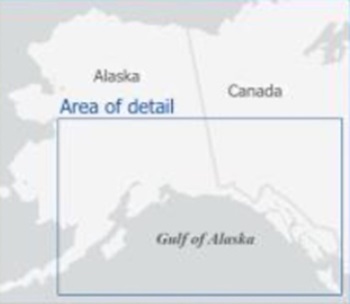 NOAA Fisheries on Thursday announced a 90-day finding on a petition to list Gulf of Alaska Chinook salmon “or any evolutionarily significant unit that may exist in the petitioned area, as a threatened or endangered species under the Endangered Species Act and to designate critical habitat concurrent with the listing.” The listing proposal comes after pressure from the Wild Fish Conservancy in Seattle, which filed a petition in January calling for federal protection of Alaska Chinook. “For decades, scientists have been sounding the alarm that Alaska’s Chinook are in dire trouble,” said Emma Helverson, executive director of the Wild Fish Conservancy. “Despite existing management plans and years of efforts by the state of Alaska, Chinook salmon continue to decline in abundance, size, diversity, and spatial structure throughout the state. Through this action, we are asking the federal government to undertake a formal status review and implement protections warranted under the Endangered Species Act, including designating critical habitat protections, to ensure the survival of these iconic fish.” more, >>CLICK TO READ<< 12:33
NOAA Fisheries on Thursday announced a 90-day finding on a petition to list Gulf of Alaska Chinook salmon “or any evolutionarily significant unit that may exist in the petitioned area, as a threatened or endangered species under the Endangered Species Act and to designate critical habitat concurrent with the listing.” The listing proposal comes after pressure from the Wild Fish Conservancy in Seattle, which filed a petition in January calling for federal protection of Alaska Chinook. “For decades, scientists have been sounding the alarm that Alaska’s Chinook are in dire trouble,” said Emma Helverson, executive director of the Wild Fish Conservancy. “Despite existing management plans and years of efforts by the state of Alaska, Chinook salmon continue to decline in abundance, size, diversity, and spatial structure throughout the state. Through this action, we are asking the federal government to undertake a formal status review and implement protections warranted under the Endangered Species Act, including designating critical habitat protections, to ensure the survival of these iconic fish.” more, >>CLICK TO READ<< 12:33
A whale washed up dead. Greens blame a Democrat.
 Environmentalists say Chellie Pingree’s defense of the Maine lobster industry could imperil a critically endangered whale. Doing what greens want would likely send the Democrat to political extinction. Conservation advocates are publicly pressuring Pingree to overturn a law that protects Maine’s prized lobster fishery. The calls come after one of only 360 remaining North Atlantic right whales washed up dead in February entangled in Maine lobstering rope. “I think it is a little bit more of a black mark on an otherwise fairly good conservation record,” said Brett Hartl, the government affairs director at the Center for Biological Diversity, on Pingree’s support of the pro-lobstering law. It’s a rare rebuke of a longtime ally who has a near-pristine voting record on environmental issues. Pingree says she has no plans to reverse course, but the incident highlights how lawmakers continue to balance environmental concerns with the everyday lives of their constituents. more, >>CLICK TO READ<< 17:57
Environmentalists say Chellie Pingree’s defense of the Maine lobster industry could imperil a critically endangered whale. Doing what greens want would likely send the Democrat to political extinction. Conservation advocates are publicly pressuring Pingree to overturn a law that protects Maine’s prized lobster fishery. The calls come after one of only 360 remaining North Atlantic right whales washed up dead in February entangled in Maine lobstering rope. “I think it is a little bit more of a black mark on an otherwise fairly good conservation record,” said Brett Hartl, the government affairs director at the Center for Biological Diversity, on Pingree’s support of the pro-lobstering law. It’s a rare rebuke of a longtime ally who has a near-pristine voting record on environmental issues. Pingree says she has no plans to reverse course, but the incident highlights how lawmakers continue to balance environmental concerns with the everyday lives of their constituents. more, >>CLICK TO READ<< 17:57
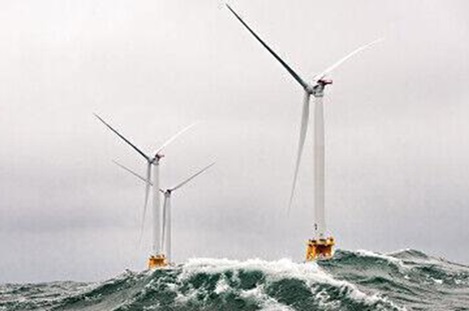
Oregon Coastal Caucus still concerned about offshore wind
Lawmakers representing Oregon’s coastal communities reiterated their concerns about offshore wind development to the Bureau of Ocean Energy Management in a strongly worded letter last week. Organized as the Oregon Coastal Caucus, the January 19 letter urging BOEM to prioritize the concerns of coastal community members and current ocean users was signed by seven Oregon legislators. They are Rep. David Gomberg, Sen. Dick Anderson, Sen. David Brock Smith, Sen. Suzanne Weber, Rep. Boomer Wright, Rep. Cyrus Javadi, and Rep. David Gomberg, Sen. Dick Anderson, Sen. David Brock Smith, Sen. Suzanne Weber, Rep. Boomer Wright, Rep. Cyrus Javadi,. “We cannot move forward with offshore wind in Oregon until the needs and concerns of these groups have been addressed,” the letter stated, noting opposition from the fishing industry, marine scientists, engineers, environmentalists, tribal governments, and coastal municipalities. more, >>click to read<< 08:53
Pallone, Environmentalists Want Shipping Speeding Rules Enforced
 Is the sonar activity related to offshore wind farms leading to whale deaths? The debate rages on. The Long Branch-based environmental group Clean Ocean Action suspects a possible connection between a spate of at least nine whales being stranded on the beaches of New Jersey and New York in December 2022 and January 2023 and wind farm activity, with COA Executive Director Cindy Zipf saying a moratorium is necessary “until an investigation is completed into why whales and the dolphins have been dying and to make sure it’s nothing to do with the intense amount of offshore wind pre-construction activity. However, other environmental groups, such as the New Jersey League of Conservation Voters and the Sierra Club, which are supporters of the wind farms and government agencies such as the Bureau of Ocean Energy Management and the National Oceanic and Atmospheric Administration, say they have found no evidence of whale deaths being linked to offshore wind activity. more, >>click to read<< 14:23
Is the sonar activity related to offshore wind farms leading to whale deaths? The debate rages on. The Long Branch-based environmental group Clean Ocean Action suspects a possible connection between a spate of at least nine whales being stranded on the beaches of New Jersey and New York in December 2022 and January 2023 and wind farm activity, with COA Executive Director Cindy Zipf saying a moratorium is necessary “until an investigation is completed into why whales and the dolphins have been dying and to make sure it’s nothing to do with the intense amount of offshore wind pre-construction activity. However, other environmental groups, such as the New Jersey League of Conservation Voters and the Sierra Club, which are supporters of the wind farms and government agencies such as the Bureau of Ocean Energy Management and the National Oceanic and Atmospheric Administration, say they have found no evidence of whale deaths being linked to offshore wind activity. more, >>click to read<< 14:23
France orders rare Atlantic fishing ban to protect dolphins
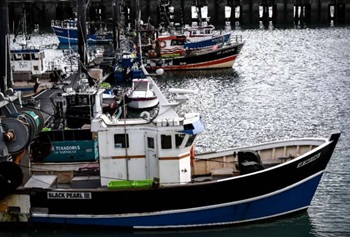 The French government will temporarily ban almost all commercial fishing in the Bay of Biscay to protect dolphins, much to the dismay of the industry. The month-long ban off the country’s West coast—the first since the end of World War II—is set to begin Monday and applies to both French and foreign fishermen. It follows calls by environmental activists to protect the marine mammals, pointing to a surge in dolphin deaths on the Atlantic coast. From Finistere in the extreme west of Brittany to the Spanish border, fishing will cease almost entirely until February 20. more, >>click to read<< 09:39
The French government will temporarily ban almost all commercial fishing in the Bay of Biscay to protect dolphins, much to the dismay of the industry. The month-long ban off the country’s West coast—the first since the end of World War II—is set to begin Monday and applies to both French and foreign fishermen. It follows calls by environmental activists to protect the marine mammals, pointing to a surge in dolphin deaths on the Atlantic coast. From Finistere in the extreme west of Brittany to the Spanish border, fishing will cease almost entirely until February 20. more, >>click to read<< 09:39
Will small boats soon have to slow down off NC to protect North Atlantic Right Whales?
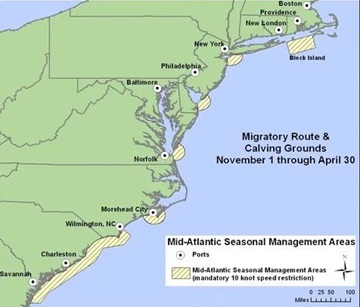 Vessel speed limits to help avoid fatal collisions between ships and one of the most endangered animals in the world that has fallen to around 350 individuals have gone back into effect off the U.S. Southeastern coast, including parts of North Carolina. The seasonal-management areas, or SMAs, limit the speed of most vessels 65 feet or longer to 10 knots, about 11.5 mph, in areas known to have heavy ship traffic that are also migratory routes or known calving grounds for the North Atlantic right whale. The go-slow zones, which run from November through April and have been in effect for more than a decade, extend about 20 nautical miles, or 23 miles, offshore and include areas around Morehead City and Beaufort and within 23 miles from shore between Wilmington and Brunswick, Ga. >>click to read<< 15:46
Vessel speed limits to help avoid fatal collisions between ships and one of the most endangered animals in the world that has fallen to around 350 individuals have gone back into effect off the U.S. Southeastern coast, including parts of North Carolina. The seasonal-management areas, or SMAs, limit the speed of most vessels 65 feet or longer to 10 knots, about 11.5 mph, in areas known to have heavy ship traffic that are also migratory routes or known calving grounds for the North Atlantic right whale. The go-slow zones, which run from November through April and have been in effect for more than a decade, extend about 20 nautical miles, or 23 miles, offshore and include areas around Morehead City and Beaufort and within 23 miles from shore between Wilmington and Brunswick, Ga. >>click to read<< 15:46
Fisherman statue will remain, Eureka mayor says in letter to PETA
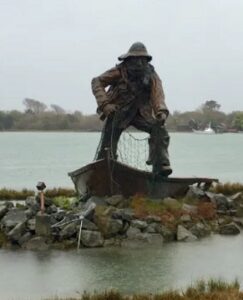 The People for the Ethical Treatment of Animals urged Eureka Mayor Kim Bergel to remove the iconic Fisherman Memorial statue from Woodley Island. Both PETA and Bergel shared letters addressing the issue. Here’s what the letters said. The following is a letter from PETA’s president to Eureka Mayor Kim Bergel: Dear Mayor Bergel: I’m writing on behalf of People for the Ethical Treatment of Animals—PETA entities have more than 9 million members and supporters globally, including many who are lucky enough to live in California—with a fintastic suggestion. >>click to read<< 10:15
The People for the Ethical Treatment of Animals urged Eureka Mayor Kim Bergel to remove the iconic Fisherman Memorial statue from Woodley Island. Both PETA and Bergel shared letters addressing the issue. Here’s what the letters said. The following is a letter from PETA’s president to Eureka Mayor Kim Bergel: Dear Mayor Bergel: I’m writing on behalf of People for the Ethical Treatment of Animals—PETA entities have more than 9 million members and supporters globally, including many who are lucky enough to live in California—with a fintastic suggestion. >>click to read<< 10:15

Industrial wind: Sierra Club should stick to their own back yard and leave mine alone
When I go to the beach, which I do almost every day, I prefer to look out on an empty ocean where the only sign of civilization is a fishing boat or two. I can see why a giant multinational energy company would want to spoil that view with 900-foot wind turbines that generate both electricity and money. But why would the Sierra Club? They cite climate change as the reason, but there are other sources of carbon-free energy such as nuclear, which the Club opposes. When I got him on the phone yesterday, Mayor Paul Kanitra told me the people in his town oppose “the industrialization of the last pristine natural resource we have in New Jersey.” “We don’t want this dystopian viewscape of red lights flashing at night and turbines droning,” Kanitra said. >click to read< 10:37
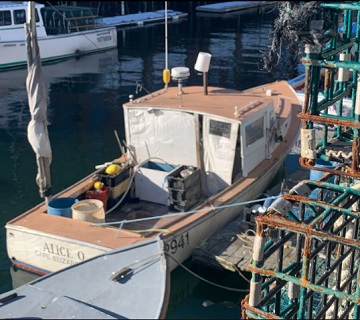
Zero means zero. ‘We’ve been innocent:’ Federal spending bill could provide lifeline for Maine lobstermen
Tuesday, Maine’s congressional delegation moved to block plans for even stricter federal regulations on Maine lobstermen designed to protect the right whale. If approved, the measure would give the U.S. lobster fishery six years before any further action is taken to prevent fishing gear from entangling whales. Lobstermen say there’s no need for new regulations on them, claiming there’s no evidence whales are getting snared in their gear, but environmentalists say this puts right whales on a path to extinction. “Zero means zero. I mean, we’ve had zero entanglements in the last 20 years,” Knight said. “There’s never been a death attributed to Maine lobster gear. We’ve been innocent right along.” Video, photos, >click to read< 09:20
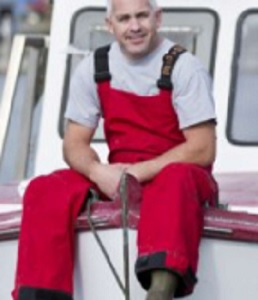
‘We’re the easiest target’: Maine lobstermen snap over regulations row
When French President Emmanuel Macron was treated to butter-poached Maine lobster at President Joe Biden’s first state dinner, the gesture was hailed 500 miles to the north. It was seen as a gesture of solidarity with an industry that is reeling from the latest in a series of blows in recent years. Having survived the pandemic and a trade war with the Chinese during the Trump years, Maine’s 10,000 lobstermen hoped brighter times were ahead. But in mid-November, the Marine Stewardship Council, an independent sustainability policeman, stepped in, triggering a clash between lobstermen, environmentalists, and the upmarket Jeff Bezos-owned Whole Foods grocery chain. >click to read< 07:34
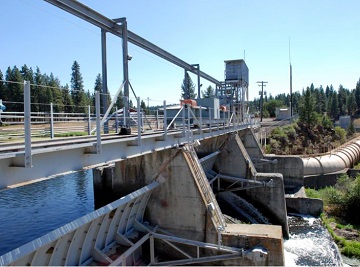
US regulators to vote on removal of four dams on lower Klamath River
The largest dam demolition and river restoration plan in the world could be close to reality Thursday as U.S. regulators vote on a plan to remove four aging hydro-electric structures, reopening hundreds of miles of California river habitat to imperiled salmon. The vote by the Federal Energy Regulatory Commission on the lower Klamath River dams is the last major regulatory hurdle and the biggest milestone facing a $500 million demolition proposal championed by Native American tribes and environmentalists for years. But plans to remove the dams have been controversial. “The whole question is, will this add to the increased production of salmon? It has everything to do with what’s going on in the ocean (and) we think this will turn out to be a futile effort,” >click to read< 11:10
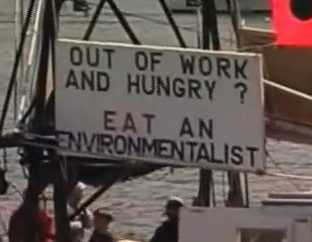
Whale injuries from drift gillnets off California spark lawsuit against U.S.
Environmentalists on Thursday sued the agency overseeing U.S. fisheries, claiming it had failed to protect endangered humpback whales from entanglement in drift gillnets used in commercial fishing off California. The lawsuit accuses the National Marine Fisheries Service of violating the Endangered Species Act by allowing drift gillnets without safeguards and failing to take into account the harm posed to whales already at risk of extinction. >click to read<, – The Center for Biological Diversity sued NOAA Fisheries today to force it to protect endangered Pacific humpback whales from entanglements in California drift gillnets. In the past two fishing seasons an estimated 12 Pacific humpbacks were caught in the California drift gillnet fishery, according to federal reports. >click to read< 10:35
Video – Outside Lobbyists Vs. Hard Data on the Right Whale Issue in Maine
For those who cannot commit to a 20+ minute presentation on the war on our fishermen: Can you spare just 5 minutes? Here is a scene from the new short film “2023” which includes some details that have been missing from your local newscasts. Click the image to watch, 12:18
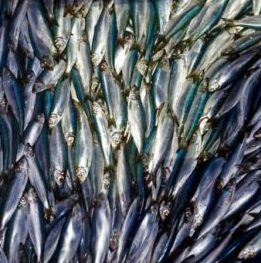
N.S., N.B. herring fishery swallows 33 per cent quota cut
Fisheries and Oceans Canada (DFO) reduced the 2022 quota, or total allowable catch, from 35,000 tonnes to 23,450 tonnes, but environmentalists say the cut does not go far enough to rebuild the stock. The Bay of Fundy Herring Industry said the TAC for this year “will create challenges for industry but is at a level that will help protect jobs, businesses and communities in the region that rely on the fishery.” DFO echoed industry in its announcement, saying its decision was a balance. This decision reduces pressure on this stock, while recognizing the needs of communities that depend on this fishery for jobs and bait,” >click to read< 13:24
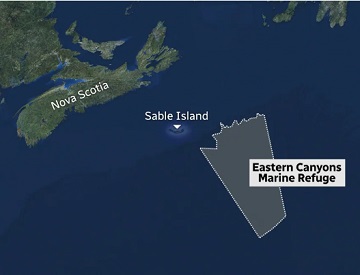
Huge deep-water area off N.S. declared a marine refuge – will be off limits to almost all fishing
An area off Nova Scotia’s coast nearly four times the size of Cape Breton was declared a marine refuge by Canada on Wednesday — World Oceans Day. Eastern Canyons Marine Refuge is a 44,000 square kilometre swath of ocean running from the edge of the continental shelf near Sable Island to Canada’s exclusive economic zone more than 300 kilometres offshore. All bottom-contact fisheries, including trawls, traps, and longlines, will be prohibited inside the marine refuge, with the exception of one fishing zone for smaller vessels that use longlines. It was criticized by some in Nova Scotia’s lucrative halibut fishery which will be blocked from most of the area. >click to read< 14:55
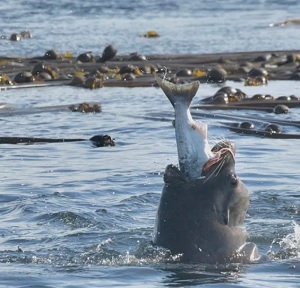
Are sea lions and seals eating too much of B.C.’s salmon? The answer may lead to a cull
An increasing number of the protected seals and sea lions (larger than seals, sea lions can walk) may be upsetting the balance of the British Columbia marine ecosystem. Now some First Nations are proposing a cull. “Environmentalists trying to stop traditional seal and sea lion hunts … are trying to starve out the Indians,” says Tom Sewid of the Kwakwak’wakw First Nation on northeastern Vancouver Island. “I won’t put up with it.” And as seals and sea lions have prospered, salmon have struggled. “The demise of the salmon runs in British Columbia is equivalent if not greater than the extinction of the great buffalo herds across the Great Plains” in the 1800s, says Sewid. > click to read < 09:01
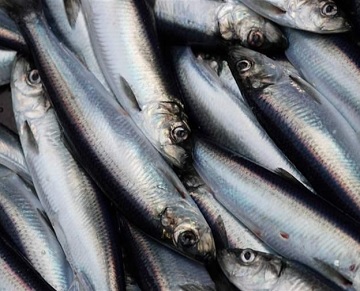
Another big Maritime fishery quota cut looming
Another Maritime fishery is facing a big quota cut this year. The only question is how big. This time it is the large herring fishery in southwestern Nova Scotia and the Bay of Fundy. The stock is in the critical zone where serious harm is occurring, but the fishery employs hundreds of people in Nova Scotia and New Brunswick. What happens next will again test how far Canada’s fisheries minister is willing to go to rebuild a depleted stock. >click to read< 09:35

Whales entangled in fishing gear could prompt early end to Dungeness crab season
On Tuesday, the California Department of Fish and Wildlife announced that one of the entangled whales had been spotted near Moss Beach, just north of Half Moon Bay, on March 11. The other was spotted on March 19 in Monterey Bay. Both were alive at the time. “In anticipation of increasing risk due to migrating humpback and blue whales, a closure will help minimize additional entanglement risk,” read a report from the department,,, However, the Dungeness crab fishing fleet in the affected areas may already be shutting itself down preemptively, said Sonoma County fisherman Dick Ogg, who is on a working group organized by the Department of Fish and Wildlife to assess risk to whales and make recommendations on when it’s time to close the season. >click to read< 07:35
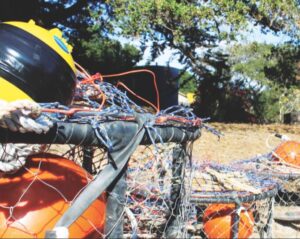
Dungeness Crab Season Could be Delayed Again this Year – The push for pop-up gear systems
This year, according to NMFS data, there have been 16 confirmed whale entanglements along the West Coast through Sept. 30. That includes 10 humpback whales, four gray whales, one fin whale and a minke whale; 11 other reports could not be verified. The vast majority of these reports came from waters along California. The California Dungeness Crab Fishing Gear Working Group, known informally as the Whale Working Group, was created in September 2015 and is made up of industry players, government officials and environmentalists looking for solutions. >click to read< 09:53
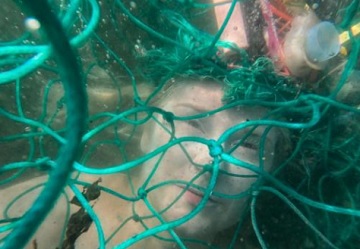
Unicorns and Mermaids! Ocean Rebellion in Cornwall call for ban on bottom trawling
Penryn’s Ocean Rebellion crew claimed to have found a gossip of mermaids entangled in discarded fishing waste. They say the pod had washed up along with a trawler boat on Sailors Creek, up the Penryn River. The group claims the mythical creatures are being killed by the effects of ghost fishing gear and damage from industrial fishing, damage that is destroying all the local coastal ecosystems they inhabit. >click to read< 09:05

Held Hostage For Ropeless? Reject the Pew Petition for 3 lobster area closures that protect no Right Whale!
Maine Delegation Calls on Commerce Secretary to Reject Petition for Seasonal and Dynamic Closures in Parts of Maine’s Lobster Fishery – Maine’s congressional delegation today pressed Commerce Secretary Gina Raimondo to reject a petition by the Pew Charitable Trusts to impose seasonal and dynamic closures on parts of Maine’s lobster fishery. The lawmakers’ objections centered on the limited effects the closures would have on protecting right whales at significant economic cost on lobstering communities up and down the state’s coast. The rulemaking proposed in the petition would close three different areas of Lobster Management Area 1 to vertical line trap fishing. Pew proposed opening those areas to ropeless fishing, ignoring the reality that ropeless technology is not commercially available, financially viable for lobstermen, or proven safe and effective. >click to read<. Read a copy of the letter here.
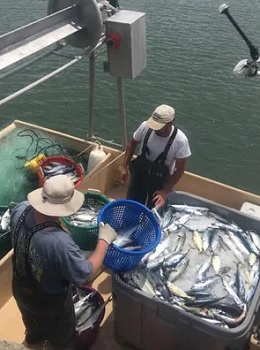
“We’re in pretty bad shape,” Commercial fishermen, fishing industry decline over the past 20 years
North Carolina commercial fishermen have complained for decades that government regulations and a variety of other factors threaten their livelihood and have them headed the way of endangered species. Glenn Skinner of Newport, executive director of the North Carolina Fisheries Association an advocacy group of commercial fishermen, said statistics back that up. “These declines are the result of many different factors. with regulations, the fear of future regulations or outright bans on commercial fishing gears being a significant factor,” Skinner said. He said public perception and political agendas drive the regulations. >click to read< 11:26






